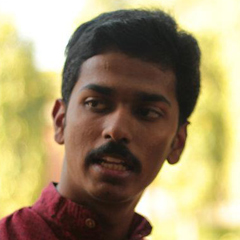Navarasa | 'Peace' review: Karthik Subbaraj’s war movie raises uneasy questions

Mail This Article
The Sri Lankan Tamil issue had been making a reel comeback recently through ‘Family Man 2’ web series and the ‘Enjoy Enjaami’ by Dhee and Arivu.
Any Tamil anthology, without touching on this, would be deemed incomplete.
Karthik Subbaraj himself, in his recent super hit on Netflix ‘Jagame Thandhiram’, had highlighted the issue and put the spotlight on Sri Lankan Tamils.
In ‘Peace,’ he is showing strife-torn Sri Lanka upfront, thereby raising several questions including the human cost of war.
The plot revolves around a bunker in a war zone and the conversations among the Tamil people occupying it. The soldiers in it face a risky choice, when a young boy seeks their help to rescue his brother.
Starting from ‘Pizza’ and ‘Jigarthanda,’ Bobby Simha has been a regular presence in Subbaraj’s movies. Simha, who never disappoints with his performance, is playing the lead role in ‘Peace’ too.
Also Read: Navarasa: Mani Ratnam's Netflix anthology | Nine Stories, Nine Emotions
Why a war for land? Aren’t their humans on both sides? Is human life more valuable than other living beings? Within a short span of 30-minutes we will be asking us all these questions and more before ending with the last question of what is peace itself.
Gautam Vasudev Menon plays the most experienced person in the bunker as ‘Master.’
All the characters have gone through extreme pain during the war and are yet fighting.
Simha’s character Nilavan represents all of them.
He lost his mother and brother to the war when he was helpless and seeks to do his bit in a similar situation for someone else now.
The conflict in his mind ends with his realisation that all humans have a bit of compassion.
Is his realisation true? We do not know.
Like Nilavan says, “Even though they have a weapon in their hand, the mind decides when and whom to kill.”


